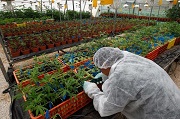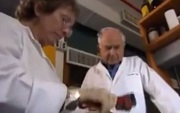One of the few cannabis trials on humans
One of the few cannabis trials on humans conducted by;Department of Biochemistry and Molecular Biology I, School of Biology, Complutense University, Madrid 28040, Spain
2Department of Neurosurgery, Hospital Universitario de Canarias, La Laguna, Tenerife 38320, Spain
A pilot clinical study of [Delta]9-tetrahydrocannabinol in patients with recurrent glioblastoma multiforme.
The pdf can be viewed here courtesy of British Journal of Cancer.
Federal govt moves towards medical cannabis regulation
Strange bedfellows Nimbin’s Hemp Embassy and Nationals Page MP Kevin Hogan have welcomed news that the federal government will seek parliamentary support to allow the controlled cultivation of cannabis for medicinal or scientific purposes in Australia.
Hemp Embassy president Michael Balderstone said the move could lead to massive opportunities for the northern rivers to increase employment in a future industry.
Mr Hogan agreed, saying the region could be a prime cultivation area.
‘I have heard numerous stories from members of our community with debilitating illnesses who want access to medicinal cannabis to help relief their chronic pain and improve the quality of their lives,’ Mr Hogan said.
‘Given our climate and strong agricultural sector, the northern rivers would be perfectly placed for the cultivation of cannabis for medicinal use,’ Mr Hogan said.
Mr Balderstone said however that while it was fantastic that the federal government was finally recognising that cannabis has terrific medicinal properties, there needed to be recognition that thousands of people used cannabis already as a medicine.
‘They’re saying it’s okay to treat things that pharmaceuticals can’t treat, or have shocking side effects, but will they keep chasing people who use it already as a medicine?’
Federal health minister Sussan Ley announced at the weekend that the government was in the process of finalising draft amendments to the Narcotics Drugs Act 1967 to allow the controlled cultivation of cannabis for medicinal and scientific purposes in Australia.
Ms Ley also said the government would create a Commonwealth licensing scheme within the department of health to ensure cultivation meets Australia’s international obligations.
She said allowing controlled cultivation locally would provide the critical “missing piece” for the Commonwealth to enable a sustainable supply of a safe medicinal cannabis product to Australian patients in the future.
It will also allow the government to closely manage the supply of medicinal cannabis products from “farm to pharmacy”, Ms Ley said.
This will be done in conjunction with necessary state or territory regulations and there will be discussions at the next COAG about how this can progress.
Ms Ley said the government was sympathetic to the suffering ‘of those Australians with debilitating illnesses and we want to enable access to the most effective medical treatments available’.
‘Currently there are already systems in place to licence the manufacture and supply of medicinal cannabis-based products in Australia, however there is no mechanism to allow the production of a safe, legal and sustainable local supply,’ she said.
‘This has meant Australian patients, researchers and manufacturers have had to try to access international supplies of legal medicinal cannabis crops and products, but limited supplies and export barriers in other countries have made this difficult.
‘Allowing the cultivation of legal medicinal cannabis crops in Australia under strict controls strikes the right balance between patient access, community protection and our international obligations.’
Mr Balderstone said the governments should see an opportunity to provide employment and economic growth in areas such as the north coast.
‘Here’s a chance to get “pot smoking dole bludgers” working and paying tax,’ Mr Balderstone said.
‘There have been 20,000 people employed in Colorado, which has the same population as Sydney, and on the north coast thousands of people could have legitimate jobs.
‘If they don’t use the local knowledge of growers who have been doing this for decades then they have rocks in their head,’ he said.
Meanwhile, Ms Ley said it was intended to have draft legislation before the parliament by the end of the year after cross-party consultations.
She said the Commonwealth licensing scheme would set out the obligations and legislative framework requirements for states and territories looking to set up agricultural industries around the cultivation of cannabis for medicinal or scientific purposes
‘It’s imperative we have a clear national licensing system to ensure we maintain the integrity of crops for medicinal or scientific purposes,’ she said.
‘It allows us to closely manage the supply of medicinal cannabis products from farm to pharmacy.
‘We also want to make sure that this approval and monitoring process for cultivation isn’t fragmented across different jurisdictions and provides regulatory consistency.’
reference: http://www.echo.net.au/2015/10/federal-govt-moves-towards-medical-cannabis-regulation/
by Darren Coyne
Federal Government to legalise growing of medicinal cannabis; Labor calls for nationwide scheme
The Federal Government has announced it will legalise the growing of cannabis for medicinal purposes.
Health Minister Sussan Ley said the Government wants to give people suffering from debilitating illnesses access to the most effective medical treatments.
She said she had been moved by stories of people who got some relief from medicinal cannabis, sometimes legally imported but not always.
"I have heard stories of patients who have resorted to illegal methods of obtaining cannabis and I have felt for them, because with a terminal condition, the most important thing is quality of life and relief of pain," she told AM.
"And we know that many people are calling out for medicinal cannabis.
"It is important therefore that we recognise those calls for help, that we put in place what we know will support a safe, legal and sustainable supply of a product."
The Government intends to amend the Narcotic Drugs Act to allow cannabis to be grown for medicine or science and ensure that Australia is not in breach of international drug treaties.
Ms Ley said it would allow cultivation similar to the way Tasmania has grown opium poppies for the world's morphine market.
She said it is possible a medicinal cannabis industry could flourish.
"It is, and that is something that some state governments I am sure will be interested in," Ms Ley said.
"You can import the product from overseas, but it is almost impossible because the demand in, for example Europe, is very high and the cost is very high too.
"So I don't want to place these difficulties in the way of patients who are terminally ill who may be able to get relief from medicinal cannabis."
Campaign groups cautiously optimistic
Ms Ley said the legalisation was only about medicinal cannabis, not recreational use.
"This is not a debate about legalisation of cannabis. This is not about drugs. This is not a product you smoke. This has nothing to do with that," she said.
"Most commonly the product is an oil or a tincture that you put on your skin."
Advocates of medicinal cannabis have cautiously welcomed the Federal Government's plan to allow the drug to be cultivated.
Lucy Haslem set up campaign group United in Compassion after her son used medicinal cannabis during his battle with terminal cancer.
She said she was grateful that politicians were starting to get onboard but that the devil would be in the detail.
"I hope what they're announcing today will be meaningful in terms of getting medicine into the hands of patients in a timely fashion," she said.
"I'm hoping that it will involve some sort of medical amnesty which could happen immediately but I guess I'm waiting to see the finer detail."
Ms Haslem said she hoped there would be no further delay before patients are able to access the drug legally.
"I hope that medicinal cannabis will be provided from within Australia. I think there's great scope for the development of a new industry," she said.
"I hope that patients with numerous serious illnesses and conditions have access to it ... I hope that we're not waiting another year or two for this to be set in motion."
Opposition pushing for nationwide scheme
The Federal Opposition has also announced it would move to legalise medicinal cannabis.
But while the Government will leave it up to the states to decide if they want to allow the drug to be grown, the shadow assistant health minister, Stephen Jones, said Labor would have a nationally consistent scheme.
"A truly national scheme to make medicinal cannabis available," Mr Jones said.
"It should not be a matter of whether you live in New South Wales or Victoria or somewhere else in Australia.
"If you are suffering from a terminal [illness], if your child has drug-resistant epilepsy suffering from life threatening fits, then you should have available to you through medical advice and appropriate channels, medicinal cannabis."
Several states have already announced clinical trials for medicinal cannabis, but until the change is made they have not been able to legally grow the crop.
The NSW Government has committed $9 million for clinical trials and up to $12 million to set up a Centre for Medicinal Cannabis Research and Innovation.
Greens leader Richard Di Natale welcomed the plan but said more needs to be done to ensure patients can access the medicine.
"We're seeing legislation that would license growers but really ignores the most important part of the equation and that is making sure that people who need this drug can get access to it," he said.
"We've got a bottleneck in the approval of medicinal cannabis and this legislation does nothing to address that."
reference:
By political correspondent Louise Yaxley
http://www.abc.net.au/news/2015-10-17/federal-government-to-legalise-growing-of-medicinal-cannabis/6862294
Cannabis OIL Cancer Cure: Dr. Raphael Mechoulam discusses medical cannabis
Raphael Mechoulam (Hebrew: רפאל משולם) (born 1930) is an Israeli organic chemist and professor of Medicinal Chemistry at the Hebrew University of Jerusalem in Israel. Mechoulam is best known for his work (together with Y. Gaoni) in the isolation, structure elucidation and total synthesis of Δ9-tetrahydrocannabinol, the main active principle of cannabis and for the isolation and the identification of the endogenous cannabinoids anandamide from the brain and 2-arachidonoyl glycerol (2-AG) from peripheral organs together with his students, postdocs and collaborators.
Raphael Mechoulam's major scientific interest is the chemistry and pharmacology of cannabinoids. He and his research group succeeded in the total synthesis of the major plant cannabinoids Δ9-tetrahydrocannabinol, cannabidiol, cannabigerol and various others. Another research project initiated by him led to the isolation of the first described endocannabinoid anandamide which was isolated and characterized by two of his postdoctoral researchers, Lumír Ondřej Hanuš and William Devane. Another endogenous cannabinoid, 2-AG, was soon discovered by Shimon Ben-Shabat, one of his PhD students. He published more than 350 scientific articles.
reference:
Latest
Coronavirus Strikes Massachusetts Cannabis Company Employees
Reassessing the Essential: Cannabis in the Time of a Pandemic
5 Reasons To Try Aspen Valley CBG Flower (30% Off)
High Times Cannabis Cups Go Virtual In Wake Of Coronavirus Pandemic
Drug Enforcement Administration Proposes Plan To Expand Cannabis Research
Ghana Legalizes Cannabis For Medicinal And Industrial Uses
The cheapest legal weed in Canada: Discover these cannabis ‘value brands’
Cannabis and coronavirus: Here’s what you need to know
cannabis designs
The Best Of
WHO Rules CBD Should Not Be a Scheduled Drug

Dr Cristina Sanchez PhD video interview on medical marijuana and cancer

Biochemist Dennis Hill interview; Cannabis oil as a cure for cancer.

The unofficial World Record holder for cannabis smoking part 1









